Lesson2 Thirteen equals one
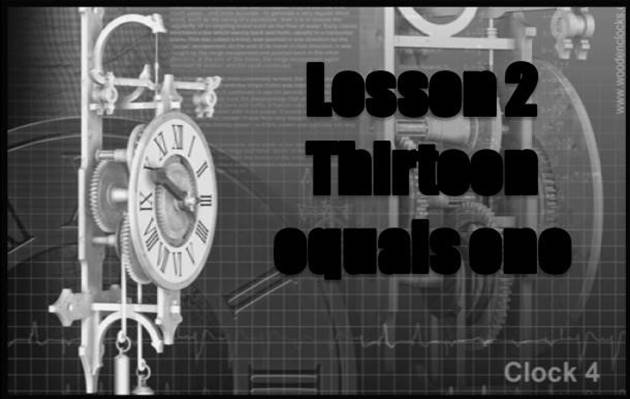
equal ['i:kwəl]
v. 等于
-
He equaled the world record.
-
Nobody equals him in strength.
-
Nobody matches him in strength.
-
In English she has no equal in her class.
be/ stand head and shoulders above sb. be much better than others
明显超过他人,鹤立鸡群
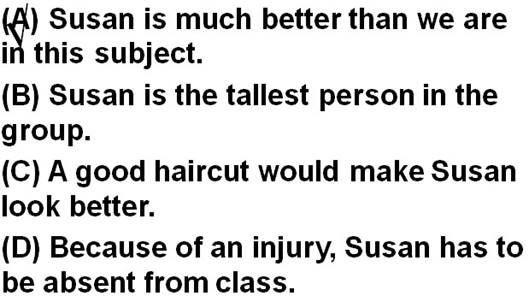
In computer programming, Susan is head and shoulders above the rest of us.
Answer: (A) Susan is much better than we are in this subject.
-
Women demand equal pay for equal work.
-
A is equal to B
-
equality
-
racial equality
-
sexual equality
-
We wish to inform you that we specialize in garments for more than twenty years, and shall be pleased to establish business relations with you on the basis of equality and mutual benefits.
raise [reɪz]
v. 募集,筹措
-
raise one’s hand
-
raise one’s voice
-
raise one’s hat to sb.
-
raise one’s glass to sb.
-
raise the roof
-
raise pigs
-
He has a big family to raise.
-
We’re raising a fund for orphans. rise
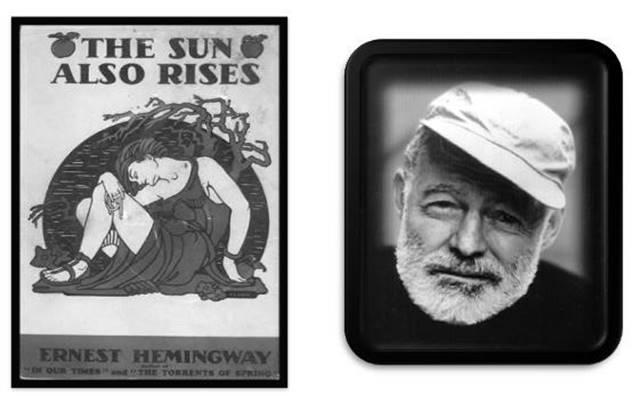
arise arose arisen
- Problems arose.
arouse arouse one’s pity / anger …
-
―You look happy today.
―Yes. I got a raise.
We pay two thousand Yuan monthly to start. It's our policy to hire on a trial basis. If you work out all right after three months you will be put on the permanent payroll and be given a raise.
be always doing sth.
-
He is always being late.
-
People are always talking about the problems of youth.
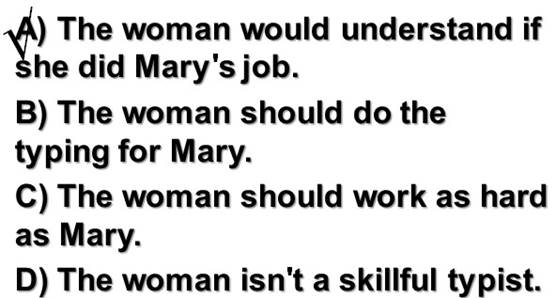
W: Mary is always complaining about her job.
M: Maybe if you try typing letters every day, you'd see what it's like.
Q: What does the man mean?
Answer: A) The woman would understand if she did Mary's job.
be forever doing sth.
He is forever talking about the friendly people, the clean atmosphere, the closeness to nature and gentle pace of living.
be constantly / continually doing sth.
-
The boys are constantly / continually arguing.
-
Your behavior reflects on me, and I can't do my job if you're constantly humiliating me.
-
Constantly? Aside from today, give me one example.
keep (on) doing sth.
-
From the moment he arrived there, he kept on pestering his doctor to tell him when he would be able to go home.
-
In the process, he enjoyed himself thoroughly and kept telling everybody how much he hated hospitals.
do sth. all the time
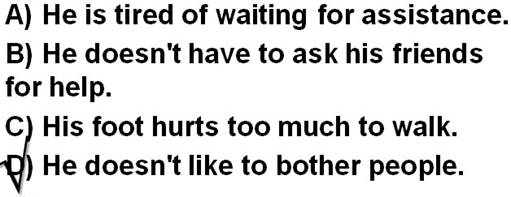
W: I thought the doctor said you should stay off your foot until the swelling goes down.
M: She did. It just makes me uncomfortable to ask my friends to wait on me all the time.
What does the man mean?
D) He doesn't like to bother people.
-
Sam, mess up the kitchen (always)
Sam is always messing up the kitchen.
-
Bruce, leave his dirty dishes on the table (forever)
Bruce is forever leaving his dirty dishes on the table.
-
Peter, try to show me he’s smarter than me (constantly)
Peter is constantly trying to show me he is smarter than me.
-
Mary, borrow my clothes without asking me (continually)
Mary is continually borrowing my clothes without asking me.
-
Why, you, make the same mistakes (keep on doing)
Why do you keep on making the same mistakes?
-
Jane, forget to give me my phone messages (do sth. all the time)
Jane forgets to give me my phone messages all the time.
One would expect them to know their parts by heart and never have cause to falter.
one … or another
-
one cause or another
-
He is always asking me for money for one cause or another.
-
Beginners will err at one time or another.
-
Everyone can contribute to society in one way or another.
one … after another
-
one day after another
-
encounter one difficulty after another
-
achieve one success after another
manage to do: 设法完成了某事
As no pumas had been reported missing from any zoo in the country, this one must have been in the possession of a private collector and somehow managed to escape.
fail to do: 没能完成某事
When the journalist again failed to reply, the editor reluctantly published the article as it had originally been written.
have sth. done 请某人做某事
-
I'm going to have my hair cut this weekend.
-
… people would rather pay large sums of money than have their life work destroyed by gangsters.
-
King CharlesⅠhad his head cut off.
-
The house had its window broken in the explosion.
无灵主语 / 物称主语 (inaminate subject)
-
When reports came into London Zoo that a wild puma had been spotted forty-five miles south of London, they were not taken seriously.
-
The sea bed was scoured with powerful nets and there was tremendous excitement on board when a chest was raised from the bottom.
He lost his confidence.
Confidence deserted him.
I couldn't sleep that night.
That night sleep eluded me.
We only travelled half the distance at sunset.
Sunset met us halfway.
-
The past few years witnessed the great influx of foreigners to China, for travelling, studies or business.
-
造句:我的小女儿总是抱怨 (complain of) 各种各样的病,但她从未成功地得到允许 (get permission) 呆在家里。
used to do
- I used to get up early.
be / become / get used to n./doing
-
I'm used to getting up early.
-
'We'll get used to that, Bill,' said the vicar.
Life is not fair, get used to it.
— Bill Gates be accustomed to (doing) sth.
For men accustomed to eating seven-course dinners and sleeping between fine linen sheets at home, the change to the Alps must have been very hard indeed.
strike the hours 钟打点报时
- It would strike twelve in twenty minutes.
ever since: adv. / prep. / conj. 从那以后,一直……(用完成时)
-
There are countless people who, ever since their early years, have learned to associate snails with food.
-
You know how she feels about you. It's been the same way ever since we were kids.
造句:过去日夜辛苦工作的老王两年前下岗 (be laid off) 了,从那以后就变得懒了。

wake (up):
vi & vt. 醒了; 唤醒…
- The doorbell rang loud enough to wake the dead.
go / get to sleep
fall asleep
toss and turn
- I was tossing and turning all night.
insomnia
- He suffered from insomnia.
sit up
stay up
- He sat up all night, preparing for the exam.
night owl
- He is a night owl.
start
n. 激灵(由于恐惧或惊讶身体突然的一动)
- wake (up) with a start
- She woke from the dream with a start.
with + 名词 作状语修饰谓语动词
-
The officer went through the case with great care.
-
He had spotted a tiny bottle at the bottom of my case and he pounced on it with delight.
-
Then I added with a smile.
-
His few material possessions make it possible for him to move from place to place with ease.


Looking at his watch, he saw that it was one o’clock, …
When he looked at his watch, he saw that it was one o’clock.
非谓语(doing; done; to do) 作状语时,一般情况下其隐含的主语应该与主句主语保持一致。
- Looking at his watch, it was one o’clock. X
before 的译法
-
强调主句的时间很长时,译为才
It will be a long time before we meet again.
-
强调主句的时间很短时,译为就
I hadn’t waited long before he came.
arm sb. with sth.
- Armed with a torch, the vicar went up into the clock tower …
sb. carry sth.
- Carrying a torch, the vicar went up into the clock tower ..
go on v. 发生(多用进行时表示正在发生的事)
- What’s going on here?
happen
occur
come up
come about take place
- The funeral will take place on Monday.
strike
- Most people were fast asleep when the earthquake struck.
ensue
- I objected to his advice and a heated argument ensued.
coincide (with …)
When I came, he was just about to leave.
My arrival coincided with his departure.
catch sight of …
catch a glimpse of …
glimpse …
-
A farm worker, who stayed up all night, claimed to have seen a figure cutting corn in the moonlight.
-
One of the most colorful figures in boxing history was Daniel Mendoza, who was born in 1764.
recognize … as …
- I recognized her as one of my classmates.
grocer grocery
this year last year
s + j = ʃ
- this year
- Bless you.
- I promise you.
t + j = tʃ
- last year
- don’t you
- won’t you
- statue
d + j = dʒ
- did you
- would you
- graduate
- credulous
z + j = ʒ
- May I use your book?
- How’s your father?
“疑问词+ever ”有两个含义
表示 “无论…”
- Wherever it went, it left behind it a trail of dead deer and small animals like rabbits.
表示 “到底…”
-
whenever, wherever, whoever, whichever ...
-
Wherever did you go yesterday? When ever am I going to see you again?
on earth
- What on earth has happened to trouble you so?
in the world
- What in the world are you doing here at seven in the morning?
in God’s / heaven’s name
-
What in God's name was that huge bang?
-
Where in heaven's name have you been?
the hell
- What the hell was that noise?
- How the hell are we going to do that?
have been doing
现在完成进行时表示持续性的动作一直到现在,而且还有可能继续下去。
night after night
- night by night
- every night
- one night after another
- day after day
- day by day
- every day
- one day after another
Oceans apart, day after day, and I slowly go insane.
- for weeks 好几周了
- for hours 好几小时了
- for months 好几个月了
- for years 好几年了
- for centuries 好几百年了
was / were hoping … 表达一种试探性的,委婉的语气。
- I was hoping you could marry me.
强调肯定式 (emphatic positive)
在肯定句和祈使句中,在谓语动词前加上助动词 do 以加强语气。只用于一般现在时 (do, does) 和一般过去时 (did) 中。
I do need a car.
He does speak English well.
So you did come after all.
- Come in.
- Do come in.
- Shut up!
- Do shut up!
as well …也…
- as well as … 除了…之外, …也…
- You’ve probably woken up everyone in the village as well as me.
- still 尽管如此,还是 …
- nevertheless
- nonetheless
- all the same
- just the same
The girl is not beautiful.
Still, I like her very much.
Nevertheless / nonetheless / all the same / just the same, I like her very much.
Still, I’m glad (that) the bell is working again.
形容词补足语
…, but I’m afraid (that) at one o’clock it will strike thirteen times and there is nothing I can do about it.
- there is nothing I can do about it 对此我无能为力
- The telephone is out of order, and there is nothing I can do about it.
- I know you are not satisfied, but there is nothing I can do about it. We apologize for this, but there is nothing we can do about it.
as good as: almost 几乎……;和……差不多
-
The injured man is as good as dead.
-
Everything is as good as settled.
-
As far as I could see, it needed only a minor adjustment: a turn of a screw here, a little tightening up there, a drop of oil and it would be as good as new.
be not one’s cup of tea Swimming is not my cup of tea.
Mountain hiking is not my cup of tea.